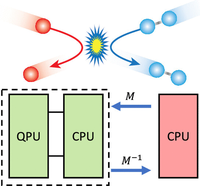Publication Date: June 30, 2023
Authors: Xiaodong Xing, Alejandro Gomez Cadavid, Artur Izmaylov (CQIQC Member), and Timur V. Tscherbul.
Abstract:
We propose a hybrid quantum-classical algorithm for solving the time-independent Schrödinger equation for atomic and molecular collisions. The algorithm is based on the S-matrix version of the Kohn variational principle, which computes the fundamental scattering S-matrix by inverting the Hamiltonian matrix expressed in the basis of square-integrable functions. The computational bottleneck of the classical algorithm─symmetric matrix inversion─is addressed here using the variational quantum linear solver (VQLS), a recently developed noisy intermediate-scale quantum (NISQ) algorithm for solving systems of linear equations. We apply our algorithm to single- and multichannel quantum scattering problems, obtaining accurate vibrational relaxation probabilities in collinear atom–molecule collisions. We also show how the algorithm could be scaled up to simulate collisions of large polyatomic molecules. Our results demonstrate that it is possible to calculate scattering cross sections and rates for complex molecular collisions on NISQ quantum processors, opening up the possibility of scalable digital quantum computation of gas-phase bimolecular collisions and reactions of relevance to astrochemistry and ultracold chemistry.
Related links

